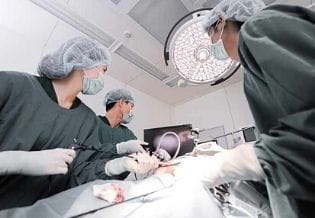Author Contributions
Academic Editor: Bo Feng, Department of Surgery,Ruijin Hospital Affiliated to Shanghai Jiaotong University School of Medicine,Shanghai Minimally Invasive Surgery Center
Checked for plagiarism: Yes
Review by: Single-blind
Copyright © 2016 Young Wan Kim. et al
 This is an open-access article distributed under the terms of the Creative Commons Attribution License, which permits unrestricted use, distribution, and reproduction in any medium, provided the original author and source are credited.
This is an open-access article distributed under the terms of the Creative Commons Attribution License, which permits unrestricted use, distribution, and reproduction in any medium, provided the original author and source are credited.
Competing interests
The authors have declared that no competing interests exist.
Citation:
Introduction
In recent years, growing numbers of patients are treated with minimally invasive surgical approaches. Thus, emergency laparoscopy, as well as elective resection, for colorectal cancer is increasingly performed based on accumulated surgical experiences. In a recent systemic review, Harji et al.1 extensively reviewed current literature about emergency laparoscopic colorectal surgeries and concluded that laparoscopic surgery may offer short-term benefits over open approach in the emergency surgical setting. We agree with the authors’ viewpoints that laparoscopic colorectal surgery is a feasible and viable option for emergency surgery 2. Herein, we would like to discuss some of the prerequisites for successful laparoscopy. First, setting the goal of surgery is important. For example, for patients with colon cancer obstruction who have failed colonic stenting, temporary decompressive colostomy followed by definitive laparoscopic surgery may be an appropriate option. Patients with locally advanced tumors or metastatic tumors may not be good candidates for laparoscopy because extensive tumor involvement to an adjacent organ increases the likelihood of conversion to open surgery. Thus, for emergency surgeries, surgeons should set the goal of surgery and decide whether to perform definitive cancer surgery or a problem-oriented surgical procedure. Second, a well-organized team approach is also important, because experienced surgical assistants, nurses, and anesthesia team members can ease the surgeon’s physical and psychological workloads. If there is a well-organized surgical team with an experienced camera operator, surgeons can attempt emergency laparoscopy. Third, detailed preoperative evaluation using imaging is critical. In emergency situations, abdominopelvic computed tomography (CT) is commonly performed, unless the patient’s vital signs are unstable. Distended and fluid-filled intestines caused by tumor obstruction may prevent adequate surgical exposure during laparoscopy, and extensive fecal soiling due to a perforated tumor may not be a good indication for laparoscopy. Thus, if preoperative CT scan data are available, it is essential that surgeons’ perform a detailed interpretation of images along with a gastrointestinal radiologist. Last, the patient’s general condition should be considered carefully and detailed history should be taken from the patient and their care provider. The American Society of Anesthesiologists physical status score, Eastern Cooperative Oncology Group score, and Karnofsky score are simple assessment tools for evaluating the patient’s functional status. Patients with a poor preoperative functional status may not tolerate pneumoperitoneum and a rather long operative time of laparoscopy. In summary, careful patient selection, preoperative assessment, and the surgical team experience are important factors for successful emergency laparoscopy for colorectal cancer.
